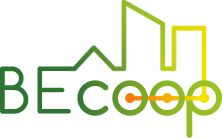June 5 – Just Energy Toolbox: Boosting skills for an inclusive and sustainable energy transition – Presentations and recording available
On 5 June 2023, as part of the EU Green Week which theme was “the European year of skills”, the BECoop, POWERPOOR and W4RES EU-funded projects presented toolkits and recommendations to support citizens and women in taking part in the energy transition.
Silvia Vivarelli (CINEA/European Commission) started the webinar with a presentation of initiatives and calls for projects to support energy communities and to mitigate energy poverty. She focused on the LIFE programme “Clean Energy Transition”.
More information on the calls can be found here: https://ec.europa.eu/info/funding-tenders/opportunities/portal/screen/programmes/life2027
Eleni Kanellou (NTUA/POWERPOOR) explained how to use the Energy Poverty Mitigation toolkit developed within the POWERPOOR project. The project aims to empower energy poor citizens and energy communities through joint energy initiatives, and the toolkit aims at providing an integrated solution to users and helping them identify whether they are vulnerable. Learn more about the toolkit here: https://powerpoor.eu/index.php/toolkit
Jaime Guerrero Belza (CIRCE/BECoop) presented the tool developed by BECoop to help and support the market uptake of the bioenergy communities and energy communities. The project has developed a series of tools, factsheets and catalogues:
- Toolkit: https://becoop.fcirce.es/toolkit/
- Self-assessment tool: https://becoop.fcirce.es/self-assessment/
- eMarket environment: https://becoop.fcirce.es/emarket/
- Factsheets and catalogues: https://www.becoop-project.eu/resources/technical-support/
The second part of the webinar focused on gender equality. Marilys Louvet (WECF/W4RES) presented the gender tools and resources that the W4RES partners have developed: support services, awareness raising campaigns, capacity building program, hackathons and seminars, policy recommendations…
The toolkit is available here: https://w4resobservatory.eu/wp-content/uploads/2023/03/D4.2_ReportCapacityBuildingFirst_v.1.pdf
Following W4RES’s presentation, Maya Angelou (Attica Energy Community) gave concrete examples of the opportunities and challenges faced by the Attica Energy Community to empower women in the renewable energy sector.
Finally, Yiannis Konstas (Q-Plan/W4RES), who moderated the webinar, emphasised the importance of fundings developed by the European Commission to help energy communities and tackle energy poverty. He also invited the participants and interested stakeholders to use and share the tools as they are very useful for citizens and the energy transition.
The presentations are now available here and you can watch the recording here.
You can also find additional information on the tools presented during the webinar here.
June 12 – Supporting energy communities in tackling energy poverty and gender inequality: skill up!
This webinar offered the opportunity to discuss how energy poverty can be tackled by increasing inclusivity and skills. Speakers addressed ways to strengthen inclusion by combining efforts led by municipalities, energy suppliers, civil society organisations and citizens. Experiences from working on the ground with women and vulnerable groups were shared, identifying barriers and opportunities for policy making and enhanced action to alleviate their energy poverty. Event moderated by Eleni Kanellou, POWERPOOR Coordinator and PhD Candidate, National Technical University of Athens (NTUA). With:
- Véronique Marx, Team Leader Just transition and Energy poverty, Unit Consumers, Local Initiatives, Just Transition DG Energy, European Commission
- Anamari Majdandžić, Senior Expert at Društvo za oblikovanje održivog razvoja (DOOR)
- Aitor Ossa Rissanen Kontaktua, GOIENER
- Agnieszka Filipiak, Kelso Institute Europe (description of the “Assisted CSOP” in Slupsk, Poland)
- Giulia Torri, Innovation Responsible, Km0
- Sonja Klingert, University of Stuttgart, EU Projects RENergetic & DECIDE
- Katharina Habersbrunner, WECF
- Alice Corovessi, Managing Director at INZEB
- Monika Bucha, Kelso Institute Europe
Recording and presentations available.
June 12 – A policy roadmap to unlock the community bioenergy in the European Union
Bioenergy communities across Europe are increasing in numbers, offering potentials for replacing fossil fuelled heat while opening the path for an ambtious, fair, and democratic energy transition. This workshop discussed the EU-level policy steps that are needed to support and promote energy communities, with particular attention to the relationship between energy communities and energy poverty alleviation.
The workshop brought together 19 speakers and representatives from think tanks, universities, advocacy groups, and the bioenergy sector itself. Its objective was to contribute to the creation of a joint roadmap that will be presented to EU decision-makers in September 2023. The workshop began with brief presentations by three prominent experts in the field: Irene di Padua, Policy Director at Bioenergy Europe; Josh Roberts, Senior Policy Advisor at ResCoop.eu; and Vanesa Gallo, National Secretary at FIPER. Subsequently, participants engaged in focused discussions within breakout groups to address the legal, technical, economic, and regulatory challenges faced by bioenergy communities in relation to EU policy making.
During the breakout sessions, the topics of conversation included the role of community bioenergy in reducing carbon emissions in the EU’s heating sector, the necessary measures to achieve this goal, and how EU-level policies can facilitate the local expansion of bioenergy communities across Europe. Additionally, participants explored strategies to enhance the social perception of bioenergy communities in the EU. The workshop proved to be highly valuable in shaping the roadmap, particularly with regards to the importance of raising awareness, sharing best practices, and establishing standardised definitions and universal support.

